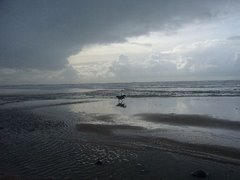Tuesday, 29 June 2010
Merde alors!
Never mind what I think about personalised dog bowls or initialled dog blankets or diamond studded collars or spraying a dog's fur pink or putting a dog in a Halloween costume or palatial dog houses but what in the world is a poop freeze spray used for?
Saturday, 19 June 2010
Happy 65th
65 today and still under house arrest. Let's not forget Aung San Suu Kyi and her plight for the people of Burma.
Thursday, 17 June 2010
Let's not forget
Edith Cavell was an English nurse, born in Norfolkshire in 1866 and the daughter of a clergyman. In 1907 she established a training school for nurses in Brussels in which hundreds of Belgian and German nurses were trained. In August 1915, during the German occupation of the city under the civil governorship of Baron von der Lancken, Cavell was suddenly arrested and imprisoned. She was charged with having aided English and Belgian young men who had come under her care as a nurse to escape to Holland and to England. Following trial in a military court on October 7th and 8th , she was condemned to be executed. In view of the fact that Cavell had devoted her life to humane service, and that the death penalty had not previously been inflicted for the offense with which she was charged, the American minister to Belgium, Brand Whitlock, endeavoured by all means in his power to prevent her execution. When Whitlock's secretary, Hugh Gibson, on the evening of her execution, sought the offices of the civil governor, Baron von der Lancken and his staff were found attending a disreputable theatre. After first denying, though later admitting, both the sentence and the order of execution, Von der Lancken refused to delay her execution or even to grant permission to telephone the Kaiser on her behalf. When reminded that her murder would rank with the burning of Louvain and the sinking of the Lusitania in stirring the civilized world with horror, Count Harrach, the civil governor's aide, remarked that his only regret was that they did not have "three or four more old English women to shoot." Despite all efforts of the American minister, Cavell was executed at 2 am on October 13th 1915.
After the war in May 1919, Cavell's body was exhumed and returned to England. With great ceremony, she was taken to Westminster Abbey for a memorial service attended by King George V and then was reburied in Norwich. Today a statue stands in her honour at St. Martin's Place near Trafalgar Square. The statue is engraved with a statement made by Cavell to her last English visitor before her execution. It reads: "Patriotism is not enough. I must have no hatred or bitterness for anyone." A special service is held there every year at the anniversary of her death.
After the war in May 1919, Cavell's body was exhumed and returned to England. With great ceremony, she was taken to Westminster Abbey for a memorial service attended by King George V and then was reburied in Norwich. Today a statue stands in her honour at St. Martin's Place near Trafalgar Square. The statue is engraved with a statement made by Cavell to her last English visitor before her execution. It reads: "Patriotism is not enough. I must have no hatred or bitterness for anyone." A special service is held there every year at the anniversary of her death.
Sunday, 13 June 2010
Chill out
Dr. Deborah Wells, senior lecturer in the School of Psychology at Queen’s University Belfast in Northern Ireland conducted a study of the effects of music on dogs in animal shelters. The study found that the type of music dogs heard had a dramatic affect on their disposition and mood. Heavy metal music caused quite a bit of barking, while pop music had about the same effect as human conversation. But when dogs were exposed to classical music, they were far more relaxed, and quiet.
Since the study was released, animal shelters in the UK have played classical music to soothe their dogs. While this makes dogs more relaxed at the shelter, it has another added benefit, though it hasn’t been scientifically documented. When people looking to adopt pets enter a shelter, soothing classical music also relaxes them, and seems to cause them to spend more time looking around. And, when dogs appear calm and relaxed, rather than nervous and anxious, they are more appealing, thus more adoptable.
Since the study was released, animal shelters in the UK have played classical music to soothe their dogs. While this makes dogs more relaxed at the shelter, it has another added benefit, though it hasn’t been scientifically documented. When people looking to adopt pets enter a shelter, soothing classical music also relaxes them, and seems to cause them to spend more time looking around. And, when dogs appear calm and relaxed, rather than nervous and anxious, they are more appealing, thus more adoptable.
Monday, 7 June 2010
Fido and Aeneas
On Saturday 5th June the Sydney Opera House hosted a concert for dogs as part of the “Vivid” Light Festival. Organised by American musician Laurie Anderson and her rock legend husband Lou Reed, the Music For Dogs event featured a surreal concerto of high-pitch whistles, synthesizers and strings.
This is how the Sydney Opera House’s website presented the event:
“The World Premiere of a unique concert experience on the Sydney Opera House Forecourt, for you… and your dog!
Laurie Anderson has composed a 20 minute work to create a shared experience for you and your dog.
The morning will be an inter-species social gathering on a scale never seen before in Australia. The site will open from 9am where breakfast can be purchased at our specially created doggie cafe, including freshly brewed coffee, egg & bacon rolls and doggie biscuits. This is an event that you’ll be yapping about for years to come, an absolute must for any dog and their two legged friends!
Unfortunately there is no public transport for you and your dog, however the Sydney Opera House car park is dog friendly and offers you a $15 flat rate for this event!
The wet weather contingency venue will be under the Sydney Opera House vehicle concourse.
ALL DOGS MUST BE ON LEADS.”
And this is what the press had to say after the event:
“The program did not go as far as listing The Barker of Seville or The Marriage of Fido, but for the hundreds of dogs who gathered at the Sydney Opera House, it was still an unusually cultured day out.
While some of the pieces were beyond the range of human ears, they sent the concert's four-legged patrons into a frenzy.
"It was really so fantastic. All the dogs were really grooving on the music. They really seemed to enjoy themselves," said Ms Anderson.
The 20-minute concert opened with a set featuring whale calls and soothing white noise, before moving through a rhythm and beat section to a discordant crescendo almost drowned out by hundreds of barks and howls.
"We've got some singing dogs down here in the mosh pit (*)," joked Ms Anderson, who led the four-piece band with a variety of instruments including slide whistle, violin and synthesizers. Organizers said that dog owners brought around 1,000 pets to enjoy the free event.
"The dogs were really wonderful audience members," Ms Anderson added. "And there were no dog fights. We were very relieved about that, everyone was very well behaved."
(*) For those of you less familiar with “youth speak” here is the definition of mosh pit: “Moshing refers to the act in which audience members at live music performances push and/or slam into each other for the purpose of fun activity and in a non-hateful way most of the time. It is most commonly associated with concerts featuring more aggressive musical genres, such as hardcore punk and heavy metal.
Moshing primarily takes place at live shows, though it can be done to recorded music. In the 2000s, many variations of moshing exist, such as "thrashing," and is typically done in an area in front of the stage which is referred to as the mosh pit or simply pit.”
This is how the Sydney Opera House’s website presented the event:
“The World Premiere of a unique concert experience on the Sydney Opera House Forecourt, for you… and your dog!
Laurie Anderson has composed a 20 minute work to create a shared experience for you and your dog.
The morning will be an inter-species social gathering on a scale never seen before in Australia. The site will open from 9am where breakfast can be purchased at our specially created doggie cafe, including freshly brewed coffee, egg & bacon rolls and doggie biscuits. This is an event that you’ll be yapping about for years to come, an absolute must for any dog and their two legged friends!
Unfortunately there is no public transport for you and your dog, however the Sydney Opera House car park is dog friendly and offers you a $15 flat rate for this event!
The wet weather contingency venue will be under the Sydney Opera House vehicle concourse.
ALL DOGS MUST BE ON LEADS.”
And this is what the press had to say after the event:
“The program did not go as far as listing The Barker of Seville or The Marriage of Fido, but for the hundreds of dogs who gathered at the Sydney Opera House, it was still an unusually cultured day out.
While some of the pieces were beyond the range of human ears, they sent the concert's four-legged patrons into a frenzy.
"It was really so fantastic. All the dogs were really grooving on the music. They really seemed to enjoy themselves," said Ms Anderson.
The 20-minute concert opened with a set featuring whale calls and soothing white noise, before moving through a rhythm and beat section to a discordant crescendo almost drowned out by hundreds of barks and howls.
"We've got some singing dogs down here in the mosh pit (*)," joked Ms Anderson, who led the four-piece band with a variety of instruments including slide whistle, violin and synthesizers. Organizers said that dog owners brought around 1,000 pets to enjoy the free event.
"The dogs were really wonderful audience members," Ms Anderson added. "And there were no dog fights. We were very relieved about that, everyone was very well behaved."
(*) For those of you less familiar with “youth speak” here is the definition of mosh pit: “Moshing refers to the act in which audience members at live music performances push and/or slam into each other for the purpose of fun activity and in a non-hateful way most of the time. It is most commonly associated with concerts featuring more aggressive musical genres, such as hardcore punk and heavy metal.
Moshing primarily takes place at live shows, though it can be done to recorded music. In the 2000s, many variations of moshing exist, such as "thrashing," and is typically done in an area in front of the stage which is referred to as the mosh pit or simply pit.”
Friday, 4 June 2010
Subscribe to:
Posts (Atom)












